Improve Your Poker Game

Poker is one of the most popular card games worldwide. It teaches people to focus and sharpen their skills, while also boosting their confidence and social skills. It is also a great way to relax and unwind from the stresses of everyday life.
Poker teaches you to think critically and make decisions based on logic
If you’re not familiar with poker, it’s a game where players put money into a pot, then try to make their best hand. The person who has the best hand wins the pot, and the rest of the money goes to the other players.
The winning hand is determined based on probability, psychology, and game theory. It’s not a fair game, but it can be exciting and thrilling to play.
Choosing your opponent carefully is an important part of playing poker successfully. You don’t want to be seated next to someone who’s going to put you in bad positions, or who won’t give you a chance to raise the stakes. Instead, find a table with a variety of players who have different strengths and weaknesses.
Always check-call rather than fold when you don’t have a lot of money in the pot and when your opponents don’t have a good hand. You’ll often get a free card on the next round of betting, which will give you a better idea of what your opponents’ hands are.
Knowing your opponents’ hands is a crucial skill in poker. You should learn to read your opponents’ hands and understand what they are likely to do on the flop, turn, and river.
Learning to bluff is another vital skill. Bluffing is a method of getting other players to think you have a good hand when you don’t, and it’s a vital skill for winning poker.
Whether you’re playing online or in a local card room, there are many strategies that can help you win at poker. Some of these include playing in position, using a bluff, and reading your opponents’ hands.
By following these tips, you’ll be able to improve your poker game and have fun doing it! You’ll be able to win more money, too!
Improves concentration and memory
During a poker game, you’re constantly focusing on your cards and deciding what to do next. This can help improve your concentration and memory, and even improve your overall mental health.
Delays dementia and Alzheimer’s by 50%
Research shows that poker can slow the development of degenerative neurological diseases like dementia and Alzheimer’s. The game requires a great deal of mental stimulation and function, and if you play regularly, it could delay the onset of these conditions by up to 50%.
Teaches coping with failure
The ability to cope with adversity is critical in life, and poker is a great way to develop this skill. If you learn to accept a loss, and take lessons from it, you’ll be able to bounce back faster and move on with your life.